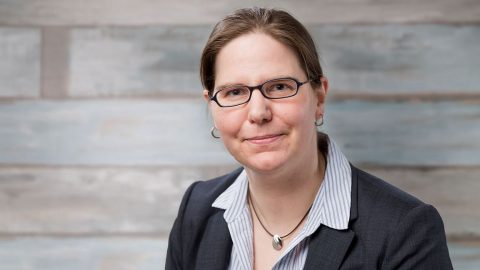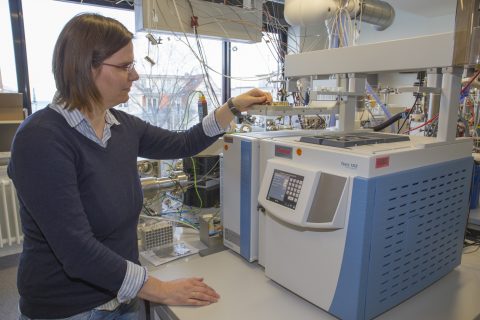Dr. Natalie Loick Wilde is head of the research group Aquatic Food Webs at the Leibniz Institute for Baltic Sea Research Warnemünde in Rostock (tenure-track). Her group uses amino acid nitrogen stable isotope approaches to elucidate how food webs regulate the matter turnover in aquatic systems.

Dr. Natalie Loick Wilde. Photo from personal archive
What inspire you to pursue a career in marine sciences?
A jellyfish on the beach when I was a child.
What are the main things you enjoy about being a marine scientist?
Being at sea (in calm weather).
What are your main professional achievements?
a) Providing the first direct evidence that the very late stage of a cyanobacteria bloom can be a flashpoint of de novo amino acid synthesis and turnover during N2 fixation (Loick-Wilde et al. in Press @ L&O).
b) The supervision of the work of my first PhD student Elvita Eglite, who identified that an increase in only a few degrees of sea surface temperature can restrict temperate key species of zooplankton from the access to cyanobacteria based food webs in the mixed layer in future enhanced stratified oceans (Eglite et al. In Review @ Ecosphere).
c) The development of a stable nitrogen isotope based approach to estimate the net growth efficiency of field zooplankton without experimental manipulations (Loick-Wilde et al. 2016, L&O).
d) The synthesis of the cascading effects of an El Niño event on the microplankton biomass and biodiversity in the most productive upwelling system of the South China Sea off the coast of Viet Nam (Loick-Wilde et al. 2017, Prog. Oceanogr.).
For a and b, it literally was a long journey including the movement of my husband (who quit his permanent position as swimming head-coach for this), my (at that time little) son, and me back and forth across the Atlantic before I finally was able to raise the funding for my own GC-C-IRMS system (rather than to use the one from my excellent terrestrial science colleague in Leipzig) to become the first scientist in a European Marine Research Institution to measure nitrogen stable isotopes in amino acids with my own system at the Baltic Sea Research Institute Warnemünde (IOW) in Rostock. I have to thank many colleagues who helped to make this happen, also because my daughter was born in the process, which cut me low on time to do certain things myself (and still does). So in a sense, it takes a whole institute to be a scientist and a mom. The IOW is a good place for this. Thanks folks!

Dr. Natalie Loick Wilde in the lab. Photo from personal archive
Did you have any role models that led you to this career? How did they influence you?
Goethe´s theory of colors, and his life-time long struggle to be respected by the scientific community. It showed me that even for someone like Goethe, science was the ultima ratio for spending your lifetime. Since I like his poems very much, but could never become a poet, I thought that I do, however, have an affection for natural sciences ever since I was little. So I decided that I can trust someone like Goethe and ever since then I also try to be a scientist.
Have you ever had any difficulties in your career due to your gender? If yes, how did you handle them?
Since finishing my PhD, I get asked by male colleagues or seniors (never females, yet) whether this was my own work, or that of my peer. In one instance, a male colleague of my age even didn´t ask but blatantly assumed that the proposal for my research group must have been the idea of my PhD mother. Any time, I reacted very calm and simply stated that these are all my ideas, and that my peers don´t have the hardware or expertise in that field. However, it gets a little boring after some years, and I might start to make fun of anyone who comes up next with such a comment. On the other hand, people don´t receive irony very well, so I guess I just have to live with this kind of mansplaning.
Do you think there is a need for special girls’ support to study marine sciences/technologies?
I think we need to start much earlier to treat boys and girls equally in many more aspects than many people do at the moment, especially towards allowing girls to take risks, leads, allow them to get dirty, all of which will allow them to identify, trust and follow their intrinsic interest etc.
How could they be encouraged to pursue careers in marine sciences and technology?
If someone, ever since she was a kid is allowed to identify and follow her interests and has people around her who believe in her (even at times, when she maybe doesn´t), she will get there by herself, if that is her intrinsic interest.
Do you think there is a need for special support to retain women in science?
It´s not just in science, it’s in leading positions in general. Just the other day the head-coach colleague of my feminist husband (yes, he got a new position as swimming head-coach after we came back from Atlanta, he´s a very good coach, you know) was attacked by a male colleague (during her absence of course) because she is pregnant now and people and institutions in the year 2017 still are highly puzzled that these things happen. The only way out most people, including women, see in a situation like that is that someone else must take over her leading position for good.
Similar reaction, when a Post-Doc after accepting a competitive working offer, declared that she is pregnant. Complete helplessness among all people (including myself!) involved in that recruitment process, even though in that example there actually was an easy way out of the loose-loose situation into a win-win situation through the way the funding agency supported the project, but we did not have the experience with that, yet, so the first reaction was complete helplessness.
These matter of facts, as I see it, reflect a lack of creativity how in a working environment a pregnant Postdoc/PhD, which most still seem to see as a loose-loose situation can be turned into a win-win situation (hey, a kid is underway, hurrah!). Why not implementing a science life fund for such a situation that everyone can pay into, say 5% of their raised project money. In case you hire a female scientist and she will drop out for some time due to pregnancy and a small kid, the money in that science life fund will be paid back to you to employ a deputy if you as a working group leader or your institution paid into that science life fund. Can´t Baltic Gender start to initiate something like that in the Baltic?
I think that starting from the minute a pregnancy is identified, a woman needs solidarity from colleagues/peers/partners, financial help, and practical help in the lab or in the field in order to be able to continue her work.
What are the most effective way for you to maintain balance of your professional and personal life?
Having a feminist husband, enjoying both lives.
What are your professional and personal dreams?
Very stereotypical, I´m afraid: making an awesome discovery that helps to connect the dots of so far loose ends in marine ecology and biogeochemistry, so basically a science or nature paper, I guess. Personal: health for my family and me.
What advice would you give any women considering science as a career path?
Stay curious, be solidarity with other women, raise your own project money, and sharpen your research profile.